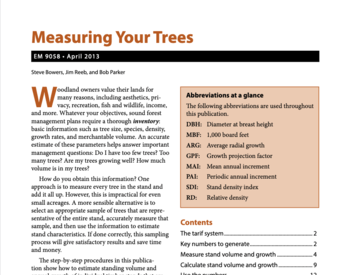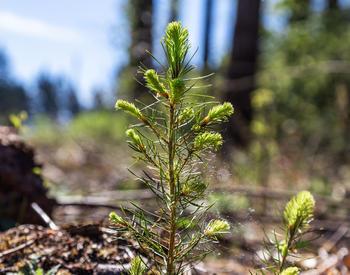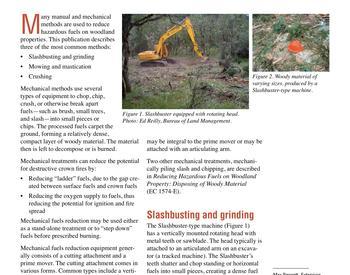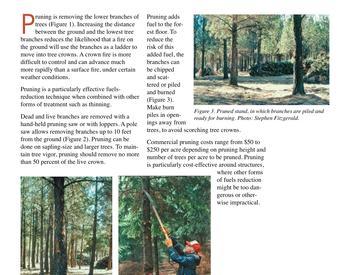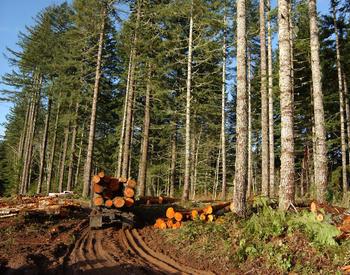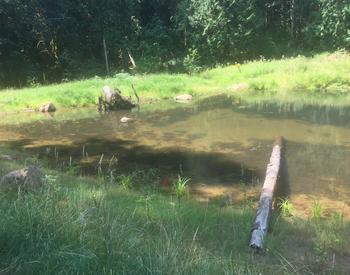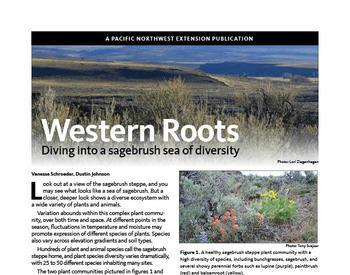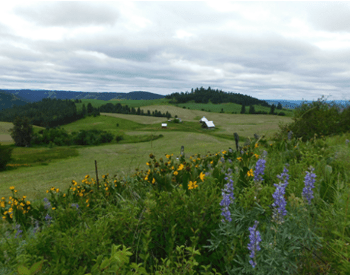Transcript
From the Oregon State University's extension service, you are listening to In the Woods with the forestry and natural resources program. This podcast aims to show the voices of researchers, land managers, and members of the public interested in telling the story of how woodlands provide more than just trees. They provide interconnectedness that is essential to your daily life. Stick around to discover a new topic related to forests on each episode.
Welcome back to another episode of In the Woods. I'm your host Lauren Grand, assistant professor of practice, and extension agent in Oregon State University's college of forestry.
For most small woodland owners, having a timber harvest usually happens only once or twice in a lifetime. And these projects can be extremely daunting and risky for those that don't have a lot of experience. So, to help clarify some of these details, I've invited Francisca Belart, our assistant professor and OSU extension timber harvesting specialist to the podcast today.
Welcome Fran. Hi Lauren. I'm so glad that you can join me on the podcast today, Fran. I'm hoping our discussion on small scale harvesting can answer some questions for people who are unfamiliar with the harvesting process, and then also just make it more approachable and less risky for small landowners.
But before we dive in, uh, can you tell us a little bit more about yourself? Um, just so it's not a really extremely long story. I will start by, um, going to my, uh, my PhD project, uh, that was related to energy production from, uh, harvest residues. I had plots all over Oregon, um, and, um, some of those plots were in really large, uh, landowner, industrial landowner property and other ones were in smaller landowners.
And, uh, in those cases, I, um, I was able to talk with small woodland owners and learn about their objectives and their goals for their property. And, um, I was very grateful that they let me do my study there. And I really enjoyed the fact that I was able to gather some data. Produce some results or conclusions that would be helpful to, for the landowner to make decisions.
So I was thinking, well, this is cool. I can do something that can actually be useful information for somebody that I can actually see and talk to. So, um, that's strangely how I learned both the most about extension even being at OSU. I learned about extension just by, you know, doing research. And so I thought, well, I would really like to find a career in extension.
So, that's how I learned about extension and, and job possibilities. And my specialty was in, um, in harvest, timber harvesting, and operations. And there was this position open about, um, harvesting specialists. So, I applied for it and I am, I am very happy that I am able to do this job and learn from landowners, uh, through the years.
Well, we're really happy that you were able to get this job too, because you're a great colleague to work with and I've learned so much more about harvesting from you. Um, and I've had so much fun putting together workshops as well. Yeah. And now I get to share that knowledge with, um, you and our listeners on timber harvesting.
So, let's start out with a bird's eye view of, you know, timber harvesting. Why might someone want to harvest in the first place? How do landowners come to this decision? So, there are many reasons why, uh, a landowner might want to harvest. Um, it could be for revenue, but of course that's not the only reason. Um, there could be a restoration project.
They might have, uh, forest land that has changed, uh, use over time. And, um, they want to restore to what would be there naturally. And that would lead to having, you know, a timber harvest, um, could be for clearing up trees that have been damaged by storm or fire, or it can also be a thinning, just part of a long term project of, you know, getting larger timber in the long term.
Um, so there are many, many reasons. Uh, but in normal circumstances, we encourage landowners, uh, to make a decision as part of a greater plan for their property. Um, depending on what their ultimate goals are for the property as a whole, any specific for each unit. Um, we encourage, um, lands to have a management plan because that really helps guide the landowner towards, towards those goals.
So the harvest comes at at a time in which it should happen. So the landowner can fulfill those, those goals over time. I guess, uh, what I'm trying to say is not a, shouldn't be a spur of the moment decision, unless there's a really big, you know, important reason for that. Right, so nobody should be waking up and saying, I think I'll harvest trees today. Correct.
Because, and you know, and practically, uh, there's a lot of stuff that goes into planning for that harvest too. So it's not that something that you can just wake up and do. Right, okay, so that planning that's a good segue, so, um, what are some things that, or what are some of the first steps that a landowner should think about when they're planning a harvest?
So, let's say the landowner already had their plan and, uh, they decided, okay, there's a unit that, you know, we're planning on harvesting. Um, so one of the first steps, uh, that we always recommend is to notify the Oregon Department of Forestry through an online system called FERNS, or alternatively, if the landlord does not want to use this online service, they can visit their local office.
Uh, legally the requirement is 15 business days before any operation starts. However, if there's something that needs to be considered, uh, before the harvest, um, these, uh, notification of operations can help the landowner figure that out beforehand. Let's say there's a live, uh, uh, fish stream that needs to be, you know, specifically handled.
Um, so then the landowner will know, uh, far in advance, if, if that needs to be done. Then, um, I would say these days, finding a logger would be a step that should be very done very far in advance, unless the landowner already has a working relationship with a logger. They will, uh, need time to find one. And the good ones are usually very busy.
So, um, we recommend to book them, uh, in advance. We did a survey in 2018, uh, in which the average lead time for them was between one and six months, uh, for them to, you know, be booking, be booked for a job. But I have also heard, uh, that loggers are booked a year in a dance or more even depending if, especially if it's, if it's a specialty logger that specializes in certain operations, they might really be booked for a really long time.
So to me... That sounds like, yeah, if you have a logger that you really like, you should try to build that working relationship with them. Do you think that would help move you up in their list? Well, um, I think small, if it's a small job, it might not be super attractive to them just because they need a lot of time and resources to move to different jobs.
Um, so if it's a small, a really small job, it might be hard, uh, to kind of move up the list. But if you have a working relationship with somebody that you've been working through the years and several harvests, uh, that will definitely help them have you, you know, considered your, your property and, and the operation a little more than others I guess.
So, and, um, I guess the third one would be to make sure there's proper access to the harvest units. You as a landowner, know your land more than anybody. So, making sure that the roads are appropriate and that there's, um, room for, for landings there. If you need an easement, let's say you need to take the wood through a road that is not your property, um, that you have everything, um, lined up for that as well, uh, is a very important step to take. Especially when you're talking about roads that are up to standard for a log truck and heavy equipment. If your roads is good for your pickup truck. It's probably not enough for a large truck.
So, to have proper access to me, that means that you are thinking about large equipment going through that road. Right, yeah, those large trucks can be pretty heavy and I bet they can do a lot of damage and need a lot more space. Absolutely. And so, and when you say an easement and that that means if you don't own the road, you need permission from a landowner, right?
Do you recommend a written contract for that? Yeah, so we recommend having a written contract that, um, states some liability. And then also, how long are you gonna be hauling timber through that road? It is also good to document how the road looks like before the operation starts and have some sort of an agreement with the owner of that road to say, okay, this is a standard that the road is in right now.
It will probably be changing as the trucks go by. But then this is how to the standard that we are going to restore this road. And, um, also important is to determine how the owner of that road, of that property, is going to be compensated. And that could be a certain amount per thousand board feet that is going through that road because the more volume it goes through it, the more affected the road will be.
Or is it a certain, um, standard that the road needs to be back to or something like that that needs to be stated on that contract. Okay, that makes sense that's important to make sure that both people are happy at the end and that relationship maintains so you can continue operations in the future.
Correct. Okay, so, you know, some of this as we mentioned earlier could be daunting or overwhelming. Um, there are professional foresters out there that can help small land owners through this process. Can you talk a little bit about what consulting foresters do and how that relationship works? Yeah, so consulting foresters are professionals that can help the landowner with all the tasks that were previously mentioned and many others that includes, uh, drafting a management plan, right.
Um, how to manage the forest for different goals, conduct forest inventories, market the timber, finding a logger, and many other tasks. Um, they can help you plan for the harvest in terms of, "Okay, is this road good enough?" Uh, you know, for a timber harvest, they have the experience, uh, and to kind of be able to assess whether the road is gonna be good enough for truck traffic, for example, or equipment. They are familiar with the local loggers, they know them and they might have a little more influence, you know, in, in getting a spot, you know, for your harvest, if they have experience and, and you, as a landowner, don't know who, who to talk to in terms of finding, you know, a logger.
Uh, they can help you market the timber as well. Um, they of course know the log buyers and, um, are able to obtain purchase orders, uh, for you and all those things.
Um, however, I always remind people to keep in mind that you will need to have a certain amount of value to be able to cover the cost of obtaining that help. So, say if you have less than a truckload of, uh, timber is probably not gonna be cost effective, um, to get that kind of help. What if you have like a large, a larger operation? You know, there's some research out there that says having a consulting forester might actually increase your total revenue.
Absolutely. Because of the, the experience. Right. So if, if this is something that you will continue to do in the future. And, um, you have the forester helping you planning for your property as a whole, and you envision that you will be more harvest, you'll be having more harvest in the future. Uh, yeah, absolutely.
Okay, so you gotta bet, right? Like any decision you gotta weigh your pros and cons and what makes the most sense for your situation? Yeah. All right, so, um, we talked a little bit about loggers and getting a logger and it being one of the first things that maybe you consider, just because there's sometimes such a large wait time.
How do you, um, find that logger and know it's the right person for the job? So, finding a logger for the most part, um, the best way of doing that is to, if you don't know anybody, is to reach out to somebody who has done a timber harvest in the past. And they know a logger that they are happy with and find a recommendation directly from somebody who's worked with the logger. That is actually doing that same, um, survey that we did in 2018.
I believe 60% of the loggers, that's how they find their jobs is through recommendation from another landowner. So, when the landowner is happy with, you know, with the logger and working with them, then you know, they, they have a long term, you know, partnership. So, they, you know, keep working with the same logger over time.
So, if, if you don't know specifically somebody who has done a recent operation, My recommendation would be to, uh, reach out to OSWA in which there are many landowners who probably have had some sort of an experience with, with a logger and you can talk to them and um, and find out somebody, uh, that they can recommend.
And the next thing is that if the landowner has never done a timber harvest. I will also recommend if possible to visit a recent harvest and kind of actually see how it looks like afterwards. Um, to me that would be, um, the ideal option. Not only talk with the logger, but, um, being able to kind of see how the, the harvest looks like afterwards. Then, if none of the, those are options, um, we do have an online Oregon Forest Industry Directory in which you can search for contractors. Um, there's also your local ODF Forester might be able to give you a list of loggers that they have been working with or that they can recommend. And finally, the associated Oregon loggers, um, website has a list of loggers by, um, by area, within Oregon, that you can, that you can contact.
Okay, so it's like interviewing almost like interviewing anybody where you'd want to get references and maybe, and part of that reference is going to a recent job that they've done to make sure it looks like the style that you'd want on your property. Right, exactly. And you know, the logger, if, if you have the opportunity of interviewing one, two or three of them, uh, the best logger is not always the cheapest one, uh, is most of the time the one that aligns with your objectives as a landowner, the best.
Yeah, that I hear that a lot with most contractors, um, is to make sure that there's good communication and that you have, you know, something in common in terms of what your objectives are, um. Right. And for a logger, some of that will also be what type of equipment they have. So how do, so you gave a lot of good examples of finding the right logger for you in terms of matching goals and who to talk to.
Is there any, you know, how do you know that they have the right equipment for the job? Or is there any specific equipment you should be looking for? So, in terms of equipment, usually I would say for the most part, loggers will specialize in certain type of operations. I would say the, the very first, um, difference would be slope.
So, um, a logger will usually have equipment that, you know, is suited for working steep terrain. And for that reason, they probably would have, you know, a cable logging operation. Um, so depending, let's say between having steep slopes in your property or flat terrain, that will determine the kind of equipment that they will have.
The next one would be whether they specialize on clear cuts or they work on, on thinnings for the most part. That will also determine what kind of equipment they have. If they are specialized in thinning they will have, uh, different type of equipment than if they were to work on clear cuts.
So, being clear on what you're like, you know, just what you said earlier, being clear on what your objectives are and asking them, you know, how they will work with you will help sort of get those questions answered then.
Right. And you can always ask them, you know, what kind of jobs have you done previously? Um, if, if they have examples of, "Yeah, I've done thinnings here and here and there." Um, that would probably mean that they have the, the equipment specific for, for thinning. Okay, great. And then of course the the question of a contract.
So, when you work with any contractor, should we, do we recommend using a contract? Yeah, all the time. Um, a contract is very important, and for the most part, I would say 95% of the loggers, um, at least on the survey that we found, um, do actually work with a contract because that's the way that, you know, you get everything in paper.
Um, you can also, you know, do it by word, but there's also always potential for problems in that, because there are so many different things that can change or happen. And you want to be sure that you have a contract to back up all those different scenarios. And, you know, it, it also includes how the contractor is gonna be paid, what kind of work is the contractor supposed to do?
Um, many landowners assume that, for example, the logger is responsible for cleaning up after they're finished. And that's not always the case. I would say for the most part, it's not the case. And it doesn't mean that they don't do that kind of work.
They do. It's just that it will probably cost more, uh, to include it. So, if you have, you know, an itemized cost, um, on your contract, you kind of know what to expect, how much is gonna cost, and it's not gonna be a surprise afterwards if something is included or is not.
That's a good point. Yeah, so it sounds like the contract protects you and it protects the logger.
So everybody knows, um, what the agreement is and how the payments are gonna work, and so it makes sense to, to have. And you touched a little bit on cleanup there, so I'll just follow up with speaking of cleanup, um, you know, you said that it's not always the case that loggers clean up, it's something that needs to be specified in the contract.
So, is that, that's probably also true with things like burn piles and planting and things like that, right? Yeah. What about trucking? I always hear that loggers usually take care of the trucking and, um, trucking costs. Is all that included as well? Um, for the most part, they will sub contract the trucking.
Uh, but when you have this contract, you want to make sure there is kind of a specification, whether the trucking is included in the bid or not. Yeah. For the most, some loggers own their own trucks. And, and, but that is good for you to have an idea of what all of those items, the falling, the logging, the loading into the trucks, the trucking, and then the cleanup, if, if you want to have that done, um, are kind of the main items that should be in the contract and you should know how much each of those costs and whether they are included in the total, in the total cost.
Okay. Okay. So we talked about cutting down the trees and potentially taking them to a mill.
Um, but which mill should you take them to? So how, I guess maybe one of the steps at the same time as finding your logger is also finding who's gonna actually purchase the trees. So, who are the people that purchase the trees? And how do you reach out to them and what should you know about contacting log buyers?
Yeah, so log buyers are the ones that rep pretty much represent the mills on the ground. Um, they are looking for logs and, and, um, raw materials for their saw mills. So, for the most part, the mill that can best utilize your particular trees. Is gonna be the mill that pays the most for them. So, the log buyer has the ability to understand and be able to kind of see, you know, their products and the logs that they care the most about, uh, about, um, in your property.
So, if you can contact at least three log buyers. If that's a possibility, um, have them come to your property, see your trees and, and, and generate and, you know, talk to you about how much those are worth for the mill and then they can give you a purchase order. The purchase order is, um, contains the breakdown of different log grades with diameters and lengths and how much the mill is paying for each one of them.
So, as I said before, the mill that, which, uh, production line matches the best, the trees that you have will be the mill that probably will pay the most for your logs. And let's say you contact three and then you have three purchase orders with different prices for what they pay. But you also need to keep in mind that the distance to the mill is very important.
And let's say, if you have one of those purchase orders, the mill is paying a lot for your logs, but then it is really far, the trucking is gonna eat your profits. And in the end it's not gonna be worth it. So, for the most part, um, I would say that the best mill is gonna be the closest one to you. As long as they take those, those different, you know, you know, log sizes and grades.
Yeah, that's a good pro tip. Yeah. So, yeah... Okay... Always consider trucking. Yeah, that's probably something that we don't think about very often. Yeah. Okay, so, um, it sounds like we've gotten to know all the players that are involved in the process. Um, and earlier we talked about the Oregon Department of Forestry and notifying them when you're planning to do a harvest.
And so that probably also relates to the harvesting laws that we follow here in Oregon. Can you talk a little bit about what the main laws are that people should know about, um, when they're considering a timber harvest? So, yeah, so the, the legals, or the law for, um, forestry is the Forest Practices Act that is, has been, um, monitored by Oregon Department of Forestry.
And this, uh, Forest Practices Act is being currently updated. There are new rules, uh, pertaining the width of riparian areas that need to be left, uh, without harvest. There are some new rules pertaining roads and the standard to the, especially the new, the roads that need to be built. They need to be built to different standards.
There's also some specifications about a steep slope logging. And, um, I believe that those will, uh, start being implemented in the following years. So, it's not something that we are going to worry about right now, but is, um, I don't quite remember exactly, uh, when they're gonna start coming into effect, but things will definitely change, um, with regards to roads and logging in the coming years.
The best person who can help you regarding these rules are your local ODF Foresters,. Your local ODF Forester, always, um, they really are helpful with small woodland owners. Uh, they, um, like to take the approach of try and help you fix something before something bad happens. So, they have a proactive kind of a proactive approach to help you not get in trouble.
Well, that's reassuring. Yeah. That their benefit they're, they're looking for education, uh, first. Right. Um, so, but there are some rules that, that won't change, right? So, things like harvest size maximums and reforesting after clear cut harvests and protection of waterways and things like that, right?
Yeah, those so, uh, so on the new rules, there's gonna be an expansion of certain rules, but the ones that are old will, um, will remain.
Okay, great. Okay, well, so those are probably the main things to at least start thinking about when you're considering a small scale harvest, um, or a timber harvest in general. Is there anything else that you'd like to add that, that we missed or that you think it's important that people think about?
Um, I would say something that is kind of always forgotten and people don't love to talk about would say, I would say as far as roads, uh, it's not the most popular topic on the classes and I understand it.
It is, and it is because for a landowner, roads means cost and it means money and it means a lot of money. So, I guess my, my biggest, um, recommendation, um, I guess for landowners is to try and keep the roads to standards. Um, in, in a way that the water is kept off the road to keep the ditches clean and your roads functioning because, in the end, although those things require time and invest and some investment.
Uh, you will be avoiding some sort of a catastrophic failure on a road, which can cost thousands and thousands of dollars. So, I would say kind of one of my final recommendations is just to keep an eye on your roads and make sure that you are not heading to a catastrophic, you know, failure on your roads, especially if you are thinking about a timber harvest.
Okay, right, it's the age old saying that prevention is cheaper and better than recovery. Right, and especially now that we will be having a new, uh, laws that will, you know, we want to make sure that there is, um, you know, we are taking a proactive, you know, approach to the to roads.
Okay, great, so now that we have, we, we have a way to encourage that from the beginning.
Okay, let's finish up our podcast with something that we can do or call to action. So, let's say that someone listening is thinking about considering a harvest. What homework would you give them? What's the first thing that they should start by doing?
So, um, the first one would be to send that notification of operations to ODF just because it can, you know, help you figure out that whether there's something in the area on the unit that you need to really be careful about. The second one would be to find a logger and get him in, you know, have them get you in their books.
Um, if you already know one just, you can just give them a call. If you don't, then you probably need a lot more time. You will need a lot of the time. Um, they are especially, especially busy during the summertime. And that is just mainly because there's access to a lot more Timberland during the summertime because you don't require rock in your roads.
So, uh, especially if you're thinking about, uh, planning a harvest in the summer. Just get the logger, um, it identified in, in their agenda. Um, then the second, the third one would be, um, to find out which forest practices act rules apply to you and figure out what needs to be done on the ground about them.
If you are unsure. Have an ODF Forester visit your property and have a chat with you if there, if you have any, any questions about what rules apply and what, which ones don't. Um, and lastly, have a good understanding of the access to the harvest unit, whether you need road improvements. Do you need to build up spur road?
Um, do you need an easement? And when thinking about this, always think of a log truck or large equipment and not your pickup truck.
Those are good tips. Okay, great, thank you so much for joining me today, Fran. It's so good to know that even though harvesting is a daunting project, there's lots of resources and people like you out there that landowners can talk to, to help them be successful in meeting their objectives and still leave the land in a good place to continue providing those ecosystem benefits that we rely on and are needed for those plants and animals that we love.
So as you're listening today, if any other questions came up about small scale harvesting, timber, harvesting, or forestry in general, that we didn't cover, uh, check out our website @inthewoodspodcast.org and hit the, tell us what you think tab, leave us a comment or a voicemail. And, um, we'll be sure to have a future episode that will address your questions. But don't leave us yet. We have our lightning round up next.
Okay, Fran as usual, we have a few more questions that we wanna ask all of our guests. So, the first one is what is your favorite tree? Uh, my favorite tree is incense- cedar. I just love the smell. Oh, that's a good smell. Yeah, they're beautiful. Okay. What is the most interesting thing you bring with you in the field?
Um, it's not something I carry always. Uh, but if there's poison Oak, I am willing to wear a Tyvek suit or this painter suit. So, there's absolutely no chance that poison Oak can, can ever reach my skin. I am extremely allergic. Yeah, poison Oak is not a fun thing to be allergic to. Yeah. It's good that you have, uh, such a good resource to help prevent that.
Okay, and then lastly, what resources would you recommend to our listeners if they're interested in diving deeper, into learning more about harvesting? So, I would highly recommend, uh, two extension publications. One of them is "Harvesting and Selling Timber, a Field Guide for Woodland Owners." Uh, this is EM9197.
Uh, you can, um, access to the, to the extension, uh, publications website. And then the other one is the "Small Scale Harvesting for Woodland Owners." Uh, EM9129. It's a shorter publication and is available for free in our extension website.
Great, thanks Fran. Uh, we'll be sure to get those links on our website and in the show notes as well.
And, um, thank you again for joining me today. This concludes our episode. Thank you all so much for listening. I hope you join us again in a couple weeks to explore another topic on Oregon's amazing forests, but until then what's in your woods?
Thank you so much for listening. Show notes with links mentioned on each episode are available on our website inthewoodspodcast.com. We would love to hear from you, visit the tell us what you think tab on our website to leave us a comment, suggest just a guest or topic, or ask a question that can be featured in a future episode. And, also, give us your feedback by filling out our survey.
In the Woods was created by Lauren Grand, Jacob Putney, Carrie Berger, Jason O'Brien and Stephen Fitzgerald, who are all members of the Oregon State University Forestry and Natural Resources Extension team. Episodes are edited and produced by Kellan Soriano. Music for In the Woods was composed by Jeffrey Hino and graphic design was created by Christina Friehauf.
We hope you enjoyed the episode and we can't wait to talk to you again next month, until then what's in your woods?
In this episode, Lauren Grand and Francisca Belart discuss the steps a woodland owner can take in order to harvest and sell their logs. Belart is OSU extension's timber harvesting specialist.



